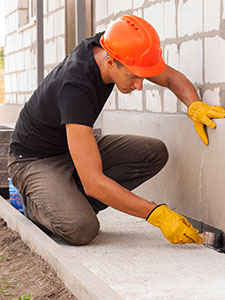POST TAGS
Home MaintenanceBlog posted On June 23, 2021

When you sell your home, you ideally want to get the biggest profit possible. Before you list it, you might renovate, hire a professional stager, paint, or do anything else you can to boost its market value. The most common updates are generally cosmetic, but if your home has certain underlying health issues, you will want to address those before making cosmetic touch ups – for your home’s market value and your own safety.
The four main components of your home’s overall health and safety include structural health, crawl space health, basement health, and home concrete health.
1. Structural health problems
The structure of your home is the foundation, walls, and basic features that help keep it standing. Common structural problems can include vertical, horizontal, or stair-step cracks; cracked bricks or concrete; wall or floor gaps; bowed basement walls; or a cracked chimney. If you notice any of these issues, you should consider hiring a professional to inspect your foundation. A simple inspection will typically cost $500 to $700. Though this might sound expensive, it’s much better than the alternative. Foundation problems that are left unfixed can lead to thousands of dollars in damage and severe physical injury as well. Experts at Groundworks say that “as foundation problems become more extreme over time, the value of your home could be reduced by as much as 30% of your asking price.”
2. Crawl space health problems
The crawl space is a small area (about one to three feet high) between your ground floor and first floor. Not all homes have crawl spaces. Common crawl space issues include flooding, wood rot, sagging floors, rodent or bug issues, and high electrical bills. If left untreated, these issues can create larger problems. Persistent moisture can lead to complications with your home’s structure and health risks with mold. Other health risks include poor air quality or rodent-borne disease.
3. Basement health problems
Your basement is the lowest level of your home, oftentimes sitting underground. Common basement problems include a leaky water heater, leaking basement windows, leaking in the basement cove, water stains on the walls or floors, efflorescence, or wet walls and floors. Issues in your basement are particularly important to take care of quickly because your lower level will determine the air quality in the rest of your home. The natural air circulation will draw air up from your basement. If your basement has moisture issues, these could lead to an increased risk of allergies and asthma. Your home’s foundational integrity can also deteriorate quickly and cause other foundational issues.
4. Home concrete health problems
Concrete is used throughout the structure and foundation of your home. Typically, you will see concrete in your driveway, garage, and basement. Common issues include sinking, uneven, or cracking concrete in your garage, driveway, sidewalk, patio, pool deck, or basement floor. Though these issues might not be as high risk as other health problems throughout your house, they can still leave uneven surfaces that can be a tripping liability. They could also lead to further foundation complications which could cause greater damage.
Maintaining a healthy home shouldn’t be difficult if you keep up with it regularly. But once you start letting the issues pile up, then they can cause more damage – both to your home’s health and your health. Plus, you could miss out on thousands of dollars in market value when it’s time to sell. If you would like to find a home inspector or appraiser, let us know and we would be happy to help connect you.
Sources: GroundWorks